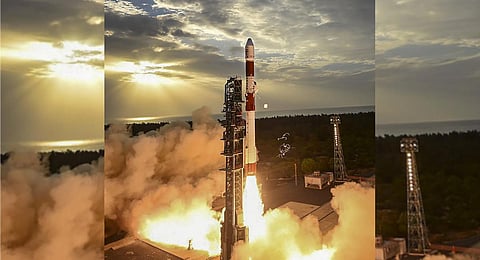

SRIHARIKOTA: It was a double delight for scientists at ISRO on Sunday as the space agency scripted a successful mission and also reaped victory in a unique scientific experiment using the fourth stage of a PSLV rocket.
In a dedicated commercial mission earlier in the day, ISRO successfully placed seven Singaporean satellites into intended orbits on board a Polar Satellite Launch Vehicle (PSLV).
During the mission, the scientists decided to perform a unique scientific experiment in which the fourth stage of the rocket would be lowered into a 300-kilometre orbit after placing customer satellites at an altitude of 536 km 'to mitigate the space debris problem', according to Chairman S Somanath.
In an update after the successful launch of the PSLV-C56 mission, ISRO said the unique attempt by the scientists is successful and ISRO/India remains committed to reducing space debris.
According to ISRO, normally after a successful mission, a rocket before re-entering into the Earth's atmosphere would travel for decades in an orbit as space debris.
However, with Sunday's experiment, the duration is now reduced to two months.
"PSLV-C56/DS-SAR Mission: The PS4 stage de-orbiting experiment is successful.The stage is purposefully manoeuvred to a 295 km x 300 km orbit," ISRO said in a social media post.